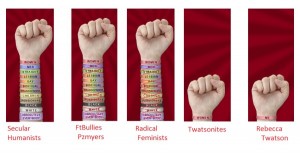Neil Denny of Little Atoms pointed out to me this piece on comedians using their fans to gang up on critics yesterday.
Being a public figure on the internet means having to deal with a barrage of abuse, which has been covered on this blog before, in my podcast interviews with Jonnie Marbles and Charlie Brooker. It’s unpleasant and unnecessary, but people quickly become emboldened by the deindividuation that occurs when their identities are withheld, given that there’s no chance of getting a punch in the hooter. Stewart Lee’s current show, Carpet Remnant World, involves a whittled down list of the most frothingly insane online critiques he could find on internet messageboards and social networking sites. The “40,000 words of hate” can be viewed on his website. They frequently seem unhinged, over-the-top and staggering in their lack of compassion and humanity – but such is the way with internet communication. People vying for attention on a crowded medium quickly escalate the ferocity of their vitriol so their opinions stand out.
Except that if their identities are witheld, it’s not really “their opinions” that stand out, it’s those of WestKilburn47 or Shoopy or Trollsalot. But West and Shoop and Trolls still want their opinions to stand out, I get that. Still there’s something odd about investing your ego in an alter ego.
Noel Fielding decided to moblize his fans to go after a critic -
a form of safety-in-numbers bullying that cast fans and followers in the guise of a personal army, mobilised to defend the fragile ego of a lazy, uninspired narcissist.
This isn’t a new phenomenon, and I’ve previously written about Ricky Gervais’ penchant for the same sort of coordinated bullying. Similarly thin-skinned, Gervais, while still new to the social networking site, quickly found that he could point his fans to negative reviews, and then pat these obedient, bile-spitting dogs on the head afterwards for fighting his battles. Some of you, I know, will say ‘but he never actually asked them to do anything’, and you’ll say the same thing when we get back to what Noel Fielding has been up to lately, towards the end of this blog. You have to decide what the reasons are for Gervais and Fielding posting these things – whether they know what the result will be – and then think about the approval explicitly given out afterwards.
That’s one of the complaints about the putative FT bullies, you know: that we do that. Well “we” don’t all do it, but it may be that some of us do, or do something like it. I’ve learned to try to be careful about that. On the other hand I think that as the level of venom goes up, the importance of relative size goes down. It’s not a straightforward calculation to make. Westboro Baptist is tiny, and feeds off publicity, but that’s not necessarily a reason to ignore it. So…it’s tricky. But the whole thing is worth keeping in mind.
(On the other hand I also see people who rant one minute about hugely popular FT blogs [? - only PZ and Ed are hugely popular] bullying smaller blogs, and rant the next minute about a comment on one FT blog [ok this one] that criticizes Dawkins. Wut? It can’t be both.)
There’s a lot more; read the whole thing. Toward the end we get Noel Fielding’s attack on MissSpidey – which sounds horribly familiar at the beginning stages.
Back to Fielding, and he’s now in a narcissistic rage over the whole affair, continuing to repeatedly tweet about MissSpidey, advocating a namechange from “Twitter” to “Cunt Platform”, and talking about how he’s a “horrible boy who likes to pull the legs off spiders.” A fairly lame attempt at contrition is made, before he RT’s a supportive fan, then immediately goes back into “fuck em” mode. Then we get a spot of victim blaming for good measure before, finally, Fielding thanks his followers for the support.
The support was, as you can see from what he chose to retweet, abusive and insulting towards MissSpidey. She was repeatedly opened up to the hostility of 340,000 followers, many of whom are young girls who worship Fielding and his contrived, try-hard, drippy fucking surrealism. Fielding personally set the tone early on to one of personal abuse, using MissSpidey’s avatar picture to make unflattering remarks about her appearance. This thread was picked up by his followers, but they went further. Much further.
MissSpidey was swamped by hundreds of mentions, from hundreds of users. These tweets, as I’ve said, mocked her physical appearance as being “old” and “ugly” – in reality, she is neither.
Well I am, and it’s not a lot more fun being sneered at for that when you are than it is when you aren’t. Actually it’s less so. (That’s litotes.)
Then it took a more sinister turn, and MissSpidey found that her address had been tracked down and was being published by the “FieldMice”, who were also threatening violence. Then she started to receive death threats – Noel Fielding was, as you’d expect, copied in on much of this by the fans seeking his approval, so presumably knew what was going on. MissSpidey tried to counter the avalanche of hostility by using the official mechanisms in place for doing so: she started to block and report the users, eventually ending up suspended from Twitter for “aggressive blocking.” I know, isn’t it?
MissSpidey suffers from Cyclothymic disorder. Twitter was a vital support network for her. With that suddenly taken away – through no fault of her own – and with a continuing barrage of hateful, hurtful messages being continually delivered to her, MissSpidey lost hope. She tried to end her own life.
Not such a good outcome.





(This is a syndicated post. Read the original at FreeThoughtBlogs.)




